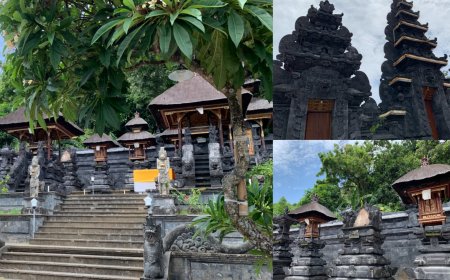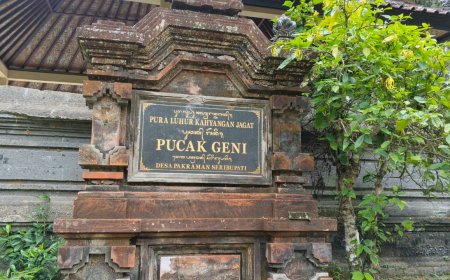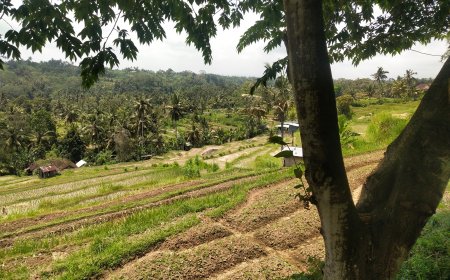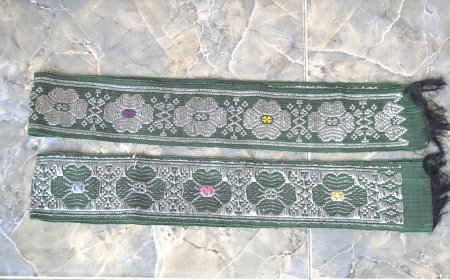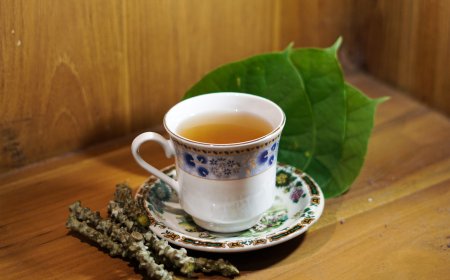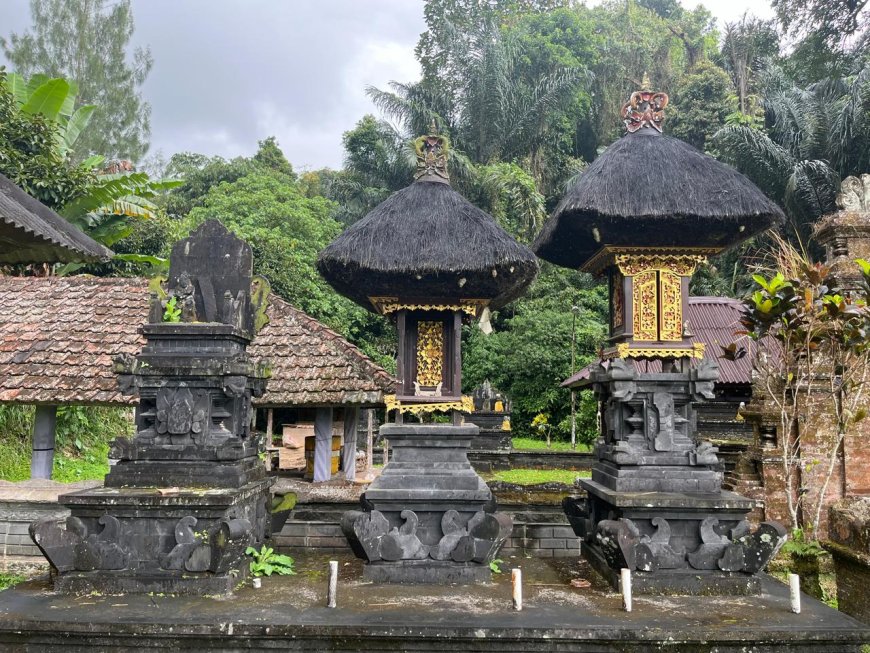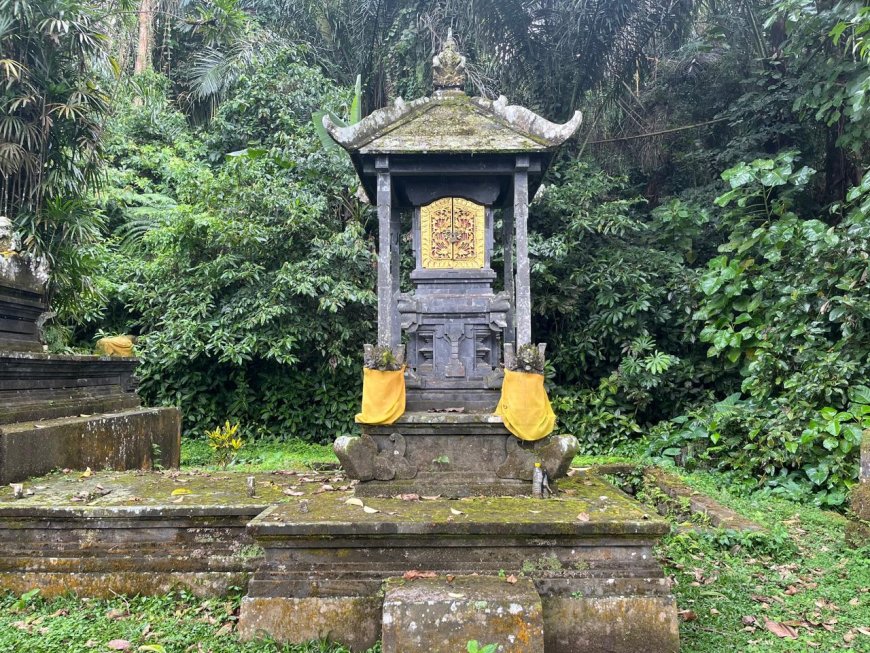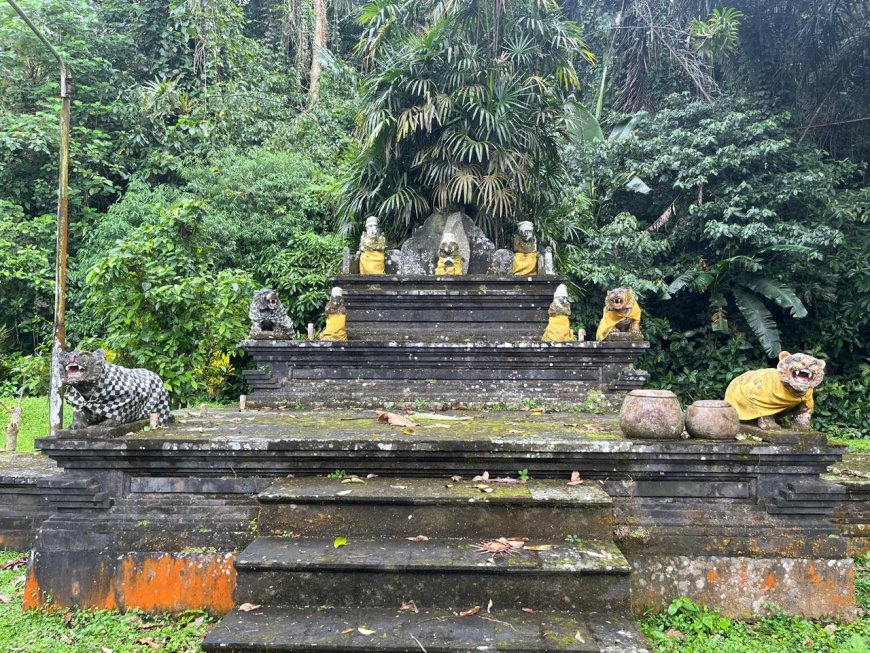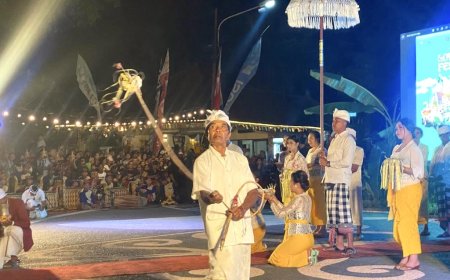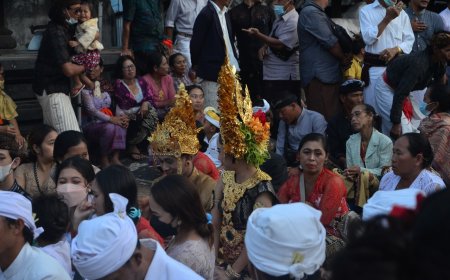Sarin Taun Tradition: An Expression of Gratitude for Agricultural Products at Ulunsuwi Temple, Jatiluwih Village
The Ngaturang Sarin Taun tradition is a ceremonial offering of gratitude to Dewi Sri for the blessing of abundant harvests, particularly the staple food (rice). The Ngaturang Sarin Taun tradition serves as a medium to convey religious messages, specifically related to Dewa Yadnya (sacrifices to the gods), indirectly for the Subak of Banjar Gunung Sari, Desa Jatiluwih, Kecamatan Penebel, Kabupaten Tabanan.
In Bali, the subak agricultural system has been practiced for a long time. As the local wisdom of Balinese society, subak always has something interesting to discuss, not only its system in the field but also the rituals or ceremonies that accompany it.
One such tradition, which has been practiced since ancient times, takes place at Pura Ulunsuwi (Pura Subak) Candikuning, located in Banjar Gunung Sari, Jatiluwih Village, Penebel District, Tabanan. This tradition, called Sarin Taun, is passed down from generation to generation and is believed to be an expression of gratitude for the agricultural produce granted by Ida Sang Hyang Widhi Wasa.
The Sarin Taun tradition is regularly held at Pura Ulunsuwi Candikuning by the members of Subak Jatiluwih Tempek Gunung Sari. However, this tradition only occurs once every three years. "Every six months, a pujawali ceremony is held, specifically on Buda Kliwon Pegat Uwakan. To hold Sarin Taun, there are two piodalan alit (minor ceremonies), followed by one piodalan ageng (major ceremony), then two more piodalan alit, and finally, the Sarin Taun ceremony is performed. So, it falls every three years." Since it is only held every three years, the Sarin Taun ceremony is very special and eagerly awaited by the krama subak (subak community).
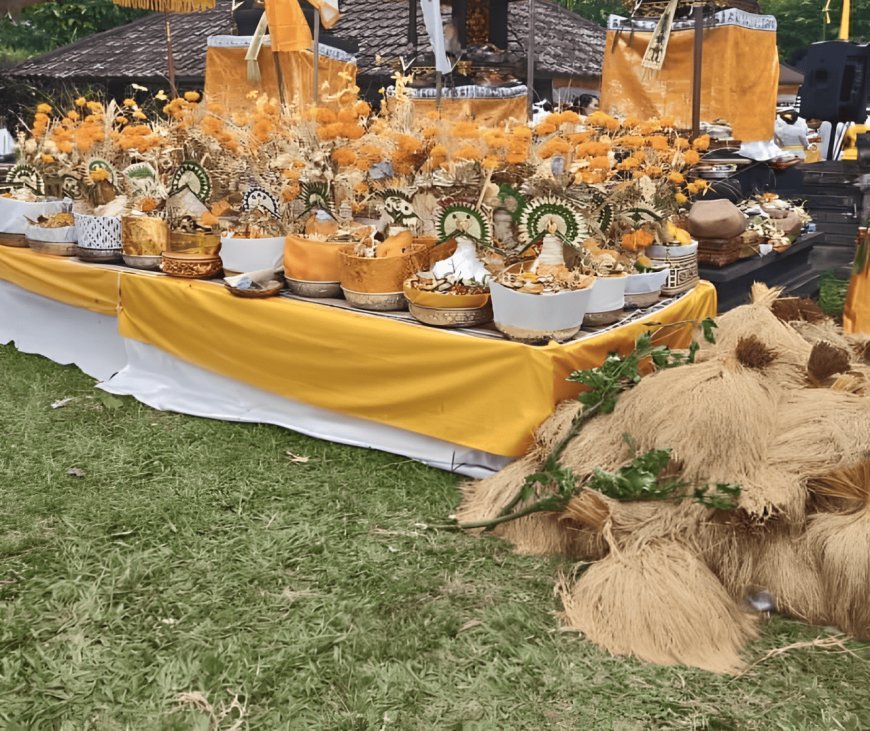
Dewa Nini Melinggih Ring Pura (Source : Personal Collection)
The beginning of the piodalan procession at the temple proceeds like any other piodalan, starting with various traditional ceremonies filled with gratitude and prayers to the gods. The ceremony starts with the preparation of offerings, canang, and banten presented by the worshippers, accompanied by sacred hymns and mantras chanted by the pemangku (priests) and pemedek (devotees). However, there is one unique stage that distinguishes this piodalan from others, which is the Sarin Taun procession.
In the Sarin Taun procession, each subak member, a group of farmers who manage the irrigation system in Bali, has a special duty to bring Dewa Nini to the temple. Dewa Nini is a very sacred symbol for the agrarian community of Bali, especially for the farmers. Dewa Nini is a beautifully decorated bundle of rice, made from the best of the Balinese rice harvest. After the harvest, the farmers, with great respect and gratitude, create this Dewa Nini bundle as a symbol of the blessings of the land they have received.
Dewa Nini is then offered during the ceremony and carefully placed in a jineng or granary in each farmer's house. Jineng is a traditional Balinese building used to store harvested rice, keeping it safe and protected from pests. Placing Dewa Nini in the jineng symbolizes that the rice is not just food, but a manifestation of the blessing from the gods, which must be preserved and respected. This procession emphasizes the importance of the relationship between humans, nature, and the gods in Balinese life, especially in their agrarian traditions. With the Sarin Taun procession, the community not only expresses gratitude for the bountiful harvest but also reinforces the crucial role of subak in maintaining traditional agriculture in Bali.
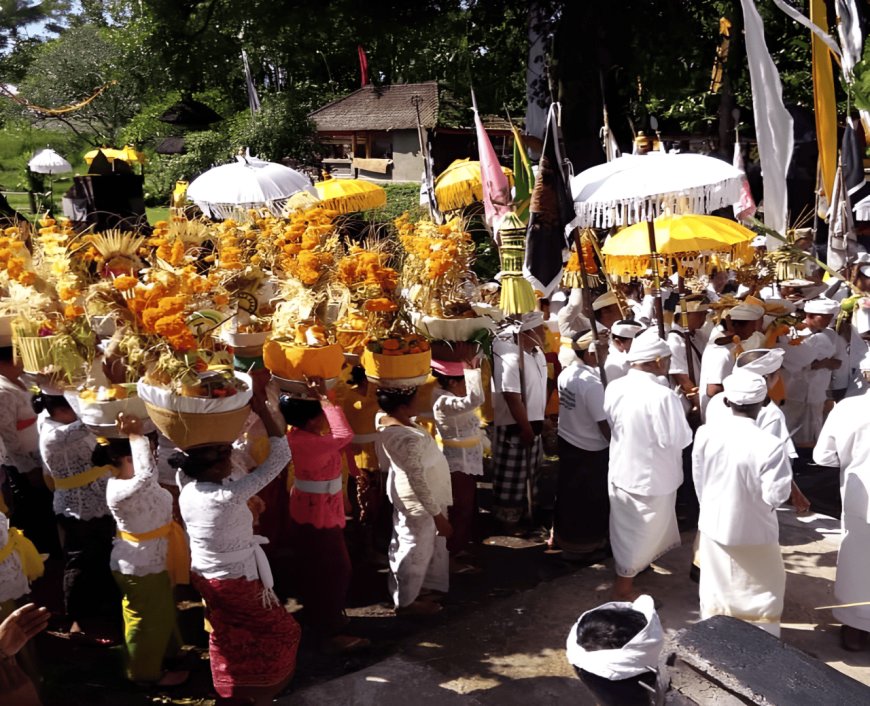
Dewa Nini Mesician Ring Beji (Source : Personal Collection)
Dewa Nini, a sacred symbol representing Dewi Sri, the goddess of prosperity and fertility in Balinese agrarian tradition, is beautifully adorned with fresh flowers in both male and female forms. After being decorated, Dewa Nini is paraded by krama subak (the farming community) to the temple for a series of ceremonies. The procession begins with pecaruan, a purification ritual, followed by memendak (the welcoming of the deity), and mesician (the sacred bathing of the symbol).
The ritual continues with pekelemigian, a special offering to honor the deities associated with life-giving forces, and culminates in the ngaturang piodalan ceremony, filled with prayers and mantras asking for blessings. Each farmer brings a bundle of rice, which will be placed in the jineng (granary) in their home as a symbol of the blessings they must protect and cherish. This procession reflects the harmonious relationship between humans, nature, and divine forces.
Once all the stages are completed, a mystical atmosphere often emerges around the temple. In this solemn and reverent mood, some people with high spiritual sensitivity, known as sutra, may experience kerauhan (trance), where they are believed to be possessed by holy spirits. During this state, they will distribute paica in the form of Manik Galih to the krama subak. Manik Galih is a sacred object believed to symbolize spiritual strength, which is later carried and placed in the jineng as a protector and blessing for the family.
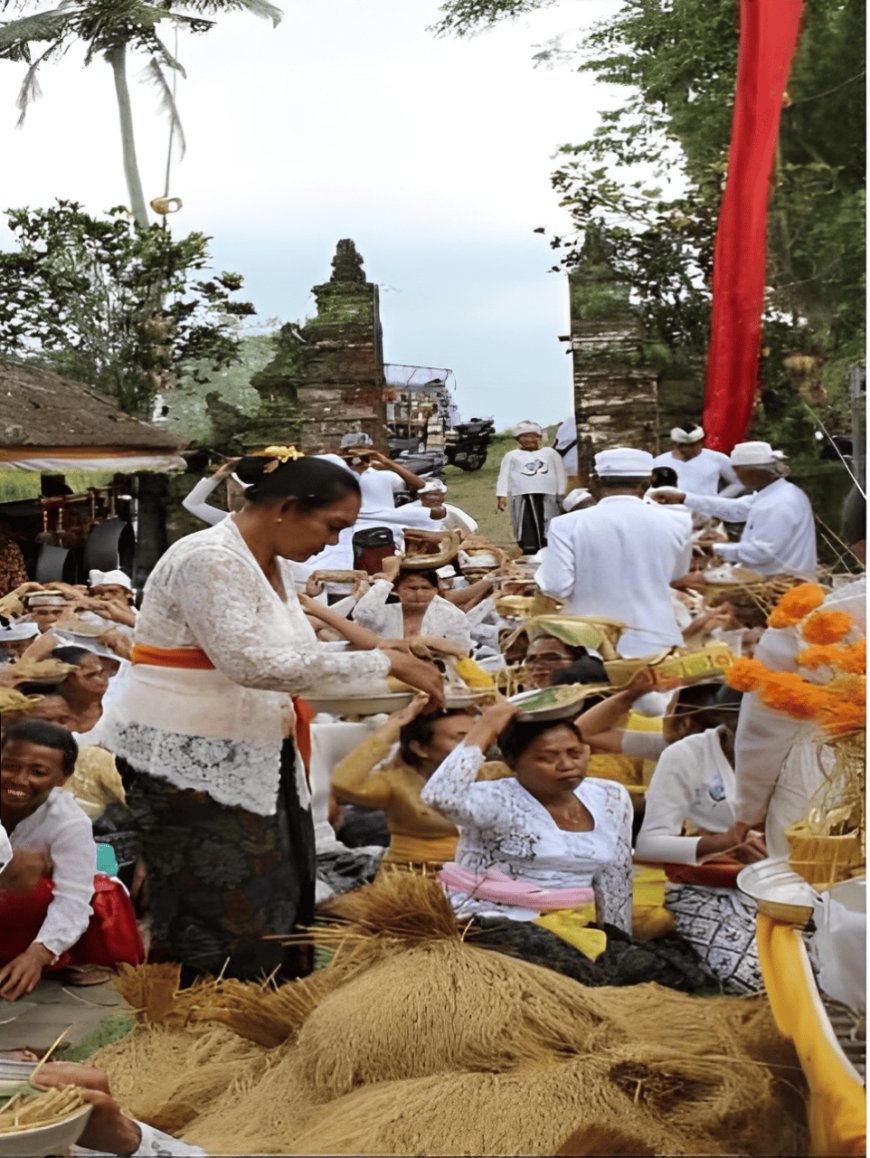
Nyineb (Sumber : Koleksi Pribadi)
After all the rituals are completed, the final stage known as nyineb is performed. Nyineb is a closing ceremony marking the end of the piodalan procession. This stage concludes all the ceremonies with closing prayers, ensuring that all offerings and rituals have been accepted by the gods and that the worshippers present have received blessings from the rituals performed.
This tradition, passed down through generations, holds great significance as an expression of gratitude for the agricultural bounty granted by Ida Sang Hyang Widhi Wasa, especially Dewi Sri as the goddess of prosperity. "We express our gratitude for the agricultural bounty we have received and ask for even better harvests in the future."
Subak Jatiluwih Tempek Gunung Sari itself has 98 members with 33 water divisions (tektek) and a cultivated land area of 60 hectares. It is acknowledged that the Sarin Taun tradition has always been held without fail, except when the desa pakraman (traditional village) is undergoing cuntaka (ritual impurity).



